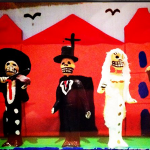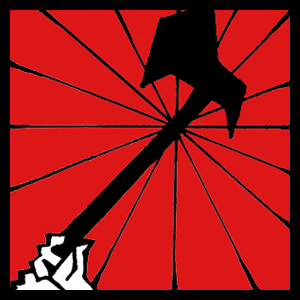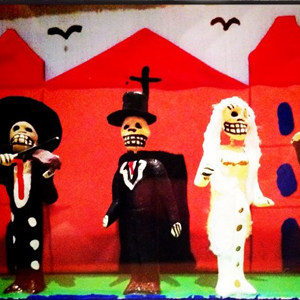182 – Coffin: The Book Worm, Part 1 of 1
Welcome to Flash Pulp, episode one hundred and eighty two.
![]()
Tonight we present, Coffin: The Book Worm, Part 1 of 1.
[audio:http://traffic.libsyn.com/skinner/FlashPulp182.mp3]Download MP3
(RSS / iTunes)
This week’s episodes are brought to you by Garaaga’s Children.
Flash Pulp is an experiment in broadcasting fresh pulp stories in the modern age – three to ten minutes of fiction brought to you Monday, Wednesday and Friday evenings.
Tonight, Will Coffin, urban shaman, and his roommate, Bunny, receive an unexpected letter regarding an avid reader.
Flash Pulp 182 – Coffin: The Book Worm, Part 1 of 1
Written by J.R.D. Skinner
Art and Narration by Opopanax
and Audio produced by Jessica May
 Coffin was staring out onto the apartment’s balcony from behind the sliding-door’s glass.
Coffin was staring out onto the apartment’s balcony from behind the sliding-door’s glass.
In the kitchen, Bunny was operating a blender and shouting explanations between bouts of ice-breaking.
“Yeah, I know they’re kinda lady-like, but sometimes I get feelin’ a little festive. Besides, how else am I going to get my vitamin C?”
It had been her idea to stay in for the evening.
“Flintstones vitamins,” he responded, only to have his words blotted out by renewed thrashing.
As the racket paused, it uncovered Bunny’s voice, mid-tune.
“…and getting caught in the rain.”
Then there was a knock at the door.
Will was mildly surprised to discover the mute standing in his hall. With an extended arm, he offered entrance to the newcomer, but the man shook his head in friendly refusal, and, instead, removed an envelope from his pocket and set it in Coffin’s palm. Nodding, the messenger then departed.
As the codger had lost his tongue early in life, the shaman was used to this being the extent of their conversation, but he couldn’t help but feel that the old bull had seemed shaken.
There were two slips of paper within the delivery, a single handwritten page, and a photocopy of scraps torn from the margins of what appeared to be fantasy novels. Beside a paragraph regarding the claiming of something called the Sword of Dawnswood was a woman’s name, Shirley Hartley, and a string of numbers. Along a bit of text describing an elven forest was another pairing – Cynthia Mayfield and a different set of digits – but also an apology. It read simply, “I’m so sorry.”
Scanning the accompanying notes, Coffin entered the kitchen.
“Forget the cocktails, we’re going out,” he said, but Bunny was already packing down a brimming thermos.
* * *
As they awaited their bus, Will muttered the letter into his roommate’s ear.
It read:
William
I have a matter which I believe requires your attention.
A kid I once knew was raiding his local used-bookstore for fiction, and came across the scrawl beside the bit about the sword. He’s a bit of a morbid little bugger, and he recognized the name from the news. He spent an afternoon tossing the shop, and he came up with the other. I have no idea if there are more – they may have been bought or missed.
Rather than find himself involved, he turned his discoveries over to me.
Those second-hand places have no real transaction records, but I got lucky – in the top right corner of the first page of both novels, the scribbler in question had signed his name: Neil Murray.
The missing both disappeared downtown, and, as you probably suspect, the numbers are GPS coordinates. As I write this, there are already uniformed men with tents and tiny brushes setting up in the woods at the edge of town.
I did some poking around just after I called in the blues. Neil is a security guard, and very fastidious. I talked to his boss briefly, and the harshest language he’s ever heard from his employee is the occasional “gosh.” All he does is sit around a waste treatment plant, watching cameras, and periodically walking the fence. He reads constantly. I’ve been inside his place, and there are books stacked up on every available surface.
None of them held any further scrawls though.
I even got my hands on a little of the patrol footage from the plant, just so I’d know Murray to see him. I had to go back and ask for some older stuff to be sure, but you can definitely make it out on the tape: he was changing. Becoming sort of – bulbous. His skin was stretching and rounding. By his last shift he was like a walking sausage with arms, right down to the translucent skin.
What I’m banking on them not finding till tomorrow is his parent’s house. When Mr and Mrs. Murray died in a car accident, he closed it up as sort of a shrine. I only know about it because of my, uh, direct investigation methodology, and hopefully it’ll take a bit for the boys to properly make their way through the paperwork.
I realize it’s a long run down the bus-line, but you need to look into 279 View’s garage.
Smith
It was deeper than Will was used to seeing the former lawman incriminate himself on paper – unless he was at hand to see the sheet burned – and by the time they were done reviewing the dispatch, Coffin was cursing every impeding stop before his own.
After an hour of swaying with regular halts, and nearing the end of the public-transport’s route, the pair found themselves deposited in a sparsely lit, but well treed, neighbourhood. It was a ten minute walk to the driveway they sought.
The pavement was cracked, but the yard was trim, and the light-blue house looked as if it might still have been lived in. There was an external side-door to the garage, and Will was pleased to find it unlocked.
A moment’s careful fumbling brought his fingers against a plastic faceplate, and he flipped on the overhead fluorescent lights. Bunny was close behind as he stepped into the open space.
In the corner furthest from the entrance, above the wooden rafters, was a massive white cocoon. Although many tendrils detached from the main body to keep the thing in place amongst the roof’s beams, the bulk of the nylon-looking weave was in a ten foot cylinder, pressed across the plywood walls at the web’s center.
“Holy ####, it’s Mothra,” said Bunny.
“Sort of,” replied Coffin, “he’s undergoing a metamorphoses. He’s becoming a moth-man.”
“Like with Richard Gere?”
“No.”
The both took a tentative step towards the silken structure, and Will found himself surveying the collected yard tools that lined the nearest wall.
He cleared his throat.
“It takes a long time for this sort of thing to happen. Months of collecting the proper nutrients – mostly pilfered from cracked braincases. I’ve known some imps who specialize in this sort of bargain, offering to turn them into a unique butterfly and all that. You need to slip off the map of reality pretty far to start seeing those hooligans though. I’m surprised he wasn’t caught talking to himself.”
“If anyone had given a ####, they’d-a noticed this ####er turning into a ###damn man-erpillar,” replied Bunny. “I’ve seen these guys lurking in the corners of laundry mats and cheap coffee shops. Poor #######s are usually too awkward to even hold their end of the conversation if you do them the favour of making small talk. I’ve always figured it was probably their upbringing.”
“Not a bad guess – might also explain why he only caved after his Ma and Pa died. At least they raised him well enough that he had some guilt about what he was doing. He’s got another week in that thing, but he likely thought his confessions would go unnoticed until well after he was beating his wings against the night sky.”
“So,” said Bunny, after a long sip from the lip of her silver canister, “what do we do? Call in a hundred-foot-tall bat?”
“Nah,” said Coffin, digging out a jerrycan. “We give him what most moths are looking for. I saw a gas station back on the main drag, let’s hustle before Smiths’ friends arrive.”
Flash Pulp is presented by http://skinner.fm, and is released under the Canadian Creative Commons Attribution-Noncommercial 2.5 License.
Coffin’s theme is Quinn’s Song: A New Man, by Kevin MacLeod ofhttp://incompetech.com/
Text and audio commentaries can be sent to skinner@skinner.fm, or the voicemail line at (206) 338-2792 – but be aware that it may appear in the FlashCast.
– and thanks to you, for reading. If you enjoyed the story, tell your friends.
 When Mother Gran had discovered Briana, one of the youngest of her children’s children’s children, the girl had been busy creating a makeshift ladder so she might throw her legs over one of the farm’s plow horses. Her Pa had warned her away from the barn on several occasions, but, as she was of Gran’s stock, she had no instinct for heeding danger – besides, she argued, she’d ridden the nags many times before, with little harm.
When Mother Gran had discovered Briana, one of the youngest of her children’s children’s children, the girl had been busy creating a makeshift ladder so she might throw her legs over one of the farm’s plow horses. Her Pa had warned her away from the barn on several occasions, but, as she was of Gran’s stock, she had no instinct for heeding danger – besides, she argued, she’d ridden the nags many times before, with little harm. I’ll admit it – Johanna was the closest to a post-apocalyptic friend that I’d had up until that point. Not that we talked much, I suppose, but she’d quickly took up a hose when it looked like my house was likely to burn down, and that sort of thing tends to make me like a person.
I’ll admit it – Johanna was the closest to a post-apocalyptic friend that I’d had up until that point. Not that we talked much, I suppose, but she’d quickly took up a hose when it looked like my house was likely to burn down, and that sort of thing tends to make me like a person. “No – I am a fext, or became one, at least. A Slavic tradition.” He finished his drink, and signaled Dorset at his station. “I am immortal, well, nearly – the list of items which might kill me is short. In my youth, years ago, I fought in wars. I was a man of bravery and recognition, or so I thought. At the age of forty – although I looked twenty at the time – I charged a cannon battery, with a broken-bladed dagger, and killed all who would stay still long enough. I was drunk at the time, but I doubt any of the dead were beyond nineteen.”
“No – I am a fext, or became one, at least. A Slavic tradition.” He finished his drink, and signaled Dorset at his station. “I am immortal, well, nearly – the list of items which might kill me is short. In my youth, years ago, I fought in wars. I was a man of bravery and recognition, or so I thought. At the age of forty – although I looked twenty at the time – I charged a cannon battery, with a broken-bladed dagger, and killed all who would stay still long enough. I was drunk at the time, but I doubt any of the dead were beyond nineteen.” Back in my fighting days I knew a fellow who’d been a stand up comedian before his chronically-broke status had forced him to enlist. I only found him funny when we were under fire, and the more determination the other side demonstrated, the faster he would spit out gags.
Back in my fighting days I knew a fellow who’d been a stand up comedian before his chronically-broke status had forced him to enlist. I only found him funny when we were under fire, and the more determination the other side demonstrated, the faster he would spit out gags.